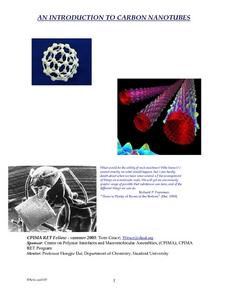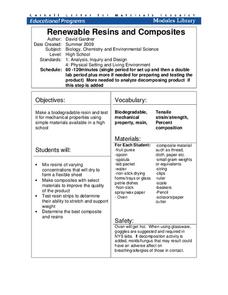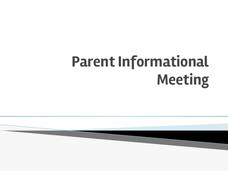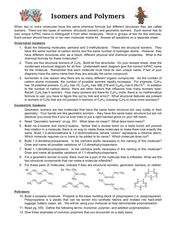Curated OER
Respiration
This series opens with diagrams of experimental setups. A data table is displayed and questions are asked, indicating that the intent is for lab groups to perform the depicted experiments. At slide twelve, a coherent lesson about the...
Curated OER
Earth's Atmosphere
This simple presentation sports a timeline of the last 400 million years. Click by click, the condition and developments in Earth's atmosphere appear along the timeline. This is a nifty PowerPoint that you could use as you teach about...
Curated OER
An Introduction To Carbon Nanotubes
Pupils engage in a study of nanotechnology that is meant to be an enrichment to the already established chemistry curriculum of high school. They are encouraged to make connections to daily life. The lesson includes background...
Curated OER
Covalent Compounds Worksheet
For this chemistry worksheet, students examine the concept of covalent bonds with the assessment. The answer key is included on page 3 and 4.
Curated OER
Chemical Reactions
In this chemical reactions worksheet, students calculate the molar mass and the rate of reaction for the given chemical reactions. This worksheet has 3 problems to solve.
Royal Society of Chemistry
A Giant Silver Mirror Experiment
Mirror, mirror, on the wall ... who's the best chemistry teacher of them all? You'll get the vote for certain after your class completes the Silver Mirror experiment! Partnered pupils use Tollen's reagent and glucose to silverplate a...
Curated OER
Sunrise/Sunset
Third graders discovver what causes the dramatic colors of a sunset by seeing the changing color of light as it passes through a clear container of water to which milk is gradually added. They measure the liquids and observe what happens...
Curated OER
Metabolism & Enzymes
More extensive than just a general overview of digestion and reactions, this slide show gives information about all areas of enzyme function. Topics like the chemistry behind efficiency of enzymes, factors that affect speed of reaction,...
American Chemical Society
Development of Baking Powder
Did you know baking powder can be used to treat acne, whiten teeth, and make sugar cookies? The lesson plan on the development of baking powder is ready-to-go with no preparation required. Through readings, pupils answer questions,...
Happy Maau Studios
Math Ref
Forgot how to multiply matrices? Well, this app can help. It is like a gigantic, well-organized reference card for all things math. Customize your personal reference material by adding your own notes and build up a personalized list of...
Curated OER
We're Off To the Races!
Second graders use a magnet to "race" objects from one side of a racing track to another. They predict what the results are, then run the race. Pupils sort and graph which items were successfully moved, they attempt to race again. This...
Cornell University
Renewable Resins and Composites
Merge chemistry with environmental science to study biodegradable materials. An engaging activity allows learners to experiment with different resin concentrations and composites. Through experimental tests, scholars test their creations...
NOAA
Deep-Sea Ecosystems – Chemosynthesis for the Classroom
Photosynthesis was discovered in the 1770s, but chemosynthesis wasn't discovered until 1977. While many have performed an experiment to show how photosynthesis works, the activity allows pupils to observe chemosynthesis. Scholars set up...
Dearborn Public Schools
Parent Informational Meeting
What factors should parents and guardians consider when helping their children select high school courses each year? A presentation designed for Parent Information Night outlines the requirements students must meet in order to graduate.
Curated OER
The East Fork Project
Students identify possible sources of health risks, types of exposures, routes of exposure, and populations that could be affected after discussing water pollution and environmental health hazards. After discussion, students conduct a...
Curated OER
Kidney Structure and Function: removing intracellular waste
Your class will learn all about the function of the kidney and how it operates in animals from different habitats. The methods of absorption, filtering and excretion are detailed and pupils will learn of the different disposal methods...
Bellevue College
Practice Drawing Lewis Structures
Twenty-six elements, compounds, and ions are randomly listed for chemistry whizzes to analyze. They are to diagram the Lewis electron dot structure for each, resulting in further insight on the configuration of different molecules. They...
Curated OER
Where is That Light Coming From?
High schoolers investigate the chemistry of bioluminescence and discuss how various organisms benefit from this trait. They prepare a report about of at least one organism that receives each of the benefits discussed.
Curated OER
Root, Root, Root for the Nutrients
Students observe the growth of a seed, predict what will happen when seeds are planted without soil, and conduct an experiment using a hydroponics system.
Curated OER
Electricity
Learners experiment with a series of circuits. In this chemistry lesson, students discuss voltage, resistance and current as they flow through an electrical circuit. They work in pairs to solve the questions.
Curated OER
Isomers and Polymers
Young scholars create models of structural isomers, geometric isomers, and polymers. In this chemistry instructional activity, students are given definitions and molecular model kits to create a variety of different isomers and polymers.
Curated OER
What's Matter?
Young scholars explore many of the basic properties of matter including atoms, ions, elements, molecules, and density. The class explores an interactive flash-animated Web site to answer questions and clarify misconceptions they might...
Curated OER
Strange Bugs
As individuals or in small groups, marine biologists research and discuss archaea and their unusual behavior as compared to bacteria. Teach them about the chemical makeup of the cell membrane of these strange organisms. This complex...
Math Worksheets Land
Patterns of Association (Using Data Table) - Matching Worksheet
This resource is the last of a four-part series that practices calculating percents based on data represetned in tables. This page has four multiple choice problems that analyze the data tables to answer a question.

























